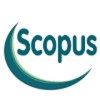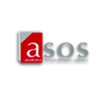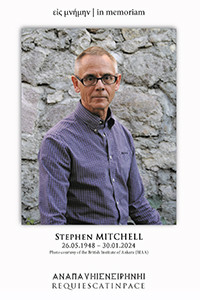Research Article
Other
Aim & Scope
Gephyra - a Journal for the Ancient History and Cultures of the Eastern Mediterranean - is an open access publication platform for articles from all fields of research into Asia Minor and the Eastern Mediterranean, insofar as they shed new light on the ancient history and culture of this geographical and historical region.
Gephyra primarily publishes new epigraphic material, but original papers on numismatics, archaeology and art history, as well as presentations of interpreted and evaluated material, historical reflections and essays presenting different perspectives and conclusions, are accepted for submission as long as they fall within the epochal scope (i.e. antiquity up to the 6th century AD) and geographical area of the journal.
Author Guidelines
The Journal of Gephyra is an open access online journal published biannulay by Research Center for Mediterranean Languages of Akdeniz University. The journal publishes contributions in the fields of epigraphy, ancient history, classical philology, numisnmatics, archaeology, history of art, culture and philosophy as long as their subjects are connected to the ancient and Mediterranean geography.
The authenticity of the submissions is under the responsibility of authors, though all the contributions are scanned by Ithenticate plagiarism detection software. By submitting a manuscript to the journal of Gephyra, the author is deemed to have accepted that the submitted material has not been formerly published and further it will not be published in any other platforms after its acceptance for publication in Gephyra. There are no charges demanded from the author for both submission and its processing.
The submissions should have confirmations from the editörs and reviewers prior to its publication. Each accepted submission is sent for evaluation at least to two reviewers, who are experts on the subject of the article. The information on the final decision is sent to the authors within 3 months at most.
The requirements of application procedure:
- The manuscripts should be submitted in one of the following languages: English, German, French and Italian.
- It should at least contain an English abstract of 250-300. A Turkish abstract will also be necessary prior to the publication, this can be produced by Turkish editors in case the author cannot write one, it might be longer and more detailed if desired.
- 5-7 keywords should be provided.
- The files to be sent should be in Microsoft Word format (2007 or later versions).
- A Unicode font which includes multilingual support should be selected for the text.
- The body of text should be set as 11 points, and footnotes 9,5.
- For Greek texts, a polytonic Unicode font should be used.
- No manual hyphenation should be marked within the text, except for special occasions as may be needed in some languages like Greek.
- The images should be selected carefully and the author should abstain from using unnecessary images that may submerge the text on a page.
- The images in the text should be properly indicated for us to know approximately where the author wishes them to be placed within the body of the text (using low quality images in the text will reduce the file size, and will be useful for e-mailing and computer handling; we will then place the original high quality images sent instead).
- The images to be sent should be of high quality, e.g. not less than 300 dpi.
Submissions should be made online via the website https://dergipark.org.tr/en/pub/gephyra. The files concerning submission can also be sent to e-mail adress gephyra.adkam@gmail.com, if necessary.
Citation
It is not compulsory to apply a certain citation system during the submission, but the accepted articles will be required to use the following bases. Gephyra basically uses the citation system of "DAI German Archaeological Institute”, since some prevalent systems (APA, MLA, Chicago, Turabian etc.) don't completely meet the need. Please check with https://www.dainst.org/en/publikationen/publizieren-beim-dai/richtlinien for additional information. The submitters are expected to have organized their paper according to following basic citation criteria:
- Monographs: “Last Name year, page(-s)”.
- Articles: “Last Name year, page(-s)”.
- The page numbers should be given in its exact intervals, meaning no use of the abbreviations “f.” or “ff.” etc.
- Please use long dash spaced on both sides ( – ) to separate authors, while short dash without space (-) between the last names of the same author; and short dash without space (-) between the pages.
- No abbreviations for iterant references, like idem, ibidem, op. cit should be used but repeated unless it is cited within the same footnote. Other abbreviations are as follows:
fn. | footnote | see | see | ca. | circa |
fn.a. | footnote above | fn.b. | Footnote below | fig. | figure |
drw. | drawing | pic.. | picture | pl. | plate |
- For the abbreviations of primary literary sources, epigraphic corpora, numismatic and papyrological sources and journals please use following lists:
- Ancient Authors: Der Neue Pauly
- Journal abbreviations: L'Année Philologique and CLAROS
- Corpora (Inscriptions): AIEGL - List of Abbreviations of Editions and Works of Reference for Alphabetic Greek Epigraphy
- Papyri: Duke Papyrus Archive
Citation Types and samples:
1. Articles in Journals:
In footnote: [Last Name] [year], [page(s)].
1 Mitchell 1986, 19; Bremen 1994, 49.
In bibliography: [Initial(s)]. [Last Name], [Title], [Journal Abbreviation] [Vol/Number], [Year], [pages].
Mitchell 1986 | S. Mitchell, Galatia under Tiberius, Chiron 16, 1986, 17-33. |
van Bremen 1994 | R. van Bremen, A Family from Sillyon, ZPE 104, 1994, 43-56. |
2. Articles/Sections in Edited Books
In footnote: [Last Name] [year], [page(s)].
1 Mitchell 1999, 19; Bremen 2010, 449.
In bibliography: [Initial(s)]. [Last Name], [Title], [“in”]: [Initial(s)] [Last Name] [“(ed(d.)”], [Title], [Place] [year], [pages] [(if applicable, Series Name and Number)].
Mitchell 1999 | S. Mitchell, The Administration of Asia Minor from 133 BC to AD 250, in: W. Eck (ed.), Lokale Autonomie und römische Ordnungsmacht in den kaiserzeitlichen Provinzen vom 1. bis 3. Jahrhundert [Schriften des Historischen Kollegs, Kolloquien 42], Münih 1999, 17-46. |
van Bremen 2010 | R. van Bremen, Adrastos at Aphrodisias, in: R.W.V. Catling – N. Kanav (edd.), Onomatologos: Studies in Greek Personal Names presented to Elaine Matthews, Oxford 2010, 440-452. |
3. Monographs
In footnote: [Last Name], [year] [Page(s)].
1 Mitchell 1993, 119; Bremen 2006, 119.
In bibliography: Initial(s)]. [Last Name], [Title], [Place] [year] [(if available, Serie Name and Number)].
Mitchell 1993 | S. Mitchell, Anatolia. Land, Men, and Gods in Asia Minor, I. The Celts and the Impact of Roman Rule; II. The Rise of the Church, Oxford 1993. |
van Bremen 2006 | R. van Bremen, The Limits of Participation. Women and Civic Life in the Greek East in the Hellenistic and Roman Periods, Amsterdam 2006. |
4. Corpora
For citing a numbered item within the text and footnote: [Abbreviation of Corpus] [Vol.] [No].
For citing a page within the text and footnote: [Abbreviation of Corpus] [Vol.], [“p.”] [page(s)] (, [“no.”] [No. of Item])
Samples:
For an inscription: TAM II 51 for page: TAM II, p. 51
For an inscription: I.Perge 51 for page: I.Perge, p. 51 or .IPerge I, p. 51
For an inscription: I.Pergamon 51 for page: I.Pergamon, p. 51
PS: Widely known corpora shall not be included in bibliography.
5. Ancient Works
It will be cited according to the work's own order: [Abbreviation of the Author]. [abbreviation of work (if available)]. [book no].[section no].[paragraph. no]. [line no]. With no space between numbers and commas.
Strab. 14.31.3; Plin. epist. 10.39; Cic. Verr. 1.31.3.
Ancient works shall not be recorded in the bibliography, unless a textual analysis is in question.
6. Numbered Items in Articles
In text or footnote: [Last Name] [year], [page(s)] [“no.”] [No].
Şahin 1988, 103 no. 4.
PS: If a work has more than two authors, use the formula of “First Author et al.”
Postal Address:
Research Centre for Mediterranean Languages and Cultures
GEPHYRA Editorial Office
Akdeniz University, Faculty of Letters
Dept. of Ancient Languages and Cultures
Campus 07058 ANTALYA - TURKEY
E-mail: gephyra.adkam@gmail.com read more
Ethical Principles and Publication Policy
Gephyra is an Open Access journal and offers its content directly to open access. The journal aims to contribute to the support and development of science with the Open Access policy. All stakeholders of the journal (authors, readers and researchers, publisher, reviewers and editors) are expected to be aware of the journal's "Open Access and Copyright Policy". After being published online, the journal is also published in print by Phoibos Verlag. Gephyra does not charge any fees for article submission, evaluation, publication or other editorial activities. The journal also does not accept sponsorship and advertising offers.
The publication processes applied in Gephyra journal constitute the basis for the impartial and reputable development and distribution of knowledge, scientific research and approaches. Each process applied in this direction directly reflects on the quality of the work of the authors and the institutions supporting the authors. Peer-reviewed publications are works that embody and support the scientific method. At this point, it is important that all stakeholders comply with the standards for ethical principles. Within the scope of Gephyra's journal publication ethics, all stakeholders are expected to carry the following ethical responsibilities.
A. Ethical Responsibilities of Authors
Author(s) submitting manuscripts for publication in the journal Gephyra are expected to comply with the following ethical responsibilities as well as the "Author Guidelines" of the journal:
- The work submitted by the author(s) is expected to be original. In case the author(s) benefit from or use other works, they are required to cite and/or quote fully and accurately. Each manuscript submitted to Gephyra is checked through iThenticate within the framework of the "Plagiarism Policy".
- Persons who do not contribute scientifically and intellectually to the content of the work should not be indicated as authors.
- All manuscripts submitted for publication must disclose any conflicts of interest and relationships, if any.
- The author(s) may be asked for raw data on their manuscripts within the framework of the evaluation processes, in such a case, the author(s) should be ready to present the expected data and information to the editorial and scientific boards.
- The author(s) should undertake that they have the rights to use the data in the manuscript, the necessary permissions related to the research/analyses, or have a document showing that the consent of the experimental subjects has been obtained.
- In the event that the author(s) becomes aware of an inaccuracy or error in the published, early view or under review manuscript, the author(s) has/have the obligation to notify the journal editor or publisher and to co-operate with the editor in correcting or withdrawing the manuscript.
- Authors may not submit manuscripts, which they have submitted to Gephyra, to another journal, nor may they submit manuscripts, which are in the submission process in another journal, to Gephyra. Each application can be started after the completion of the previous application. Manuscripts published in another journal cannot be submitted to Gephyra Journal.
- It cannot be proposed to change the author responsibilities (such as adding an author, changing the author order, removing an author) of a submission, whose evaluation process has started.
- Authors should observe the copyrights of items such as tables, images, maps, etc. that they use in their manuscripts and do not belong to them, and should correctly show the necessary attribution or permission.
B. Ethical Duties and Responsibilities of Editors
1. General duties and responsibilities
Editors are responsible for all kinds of articles published in Gephyra . In the context of this responsibility, the editors have the following roles and obligations:
- To endeavour to meet the information needs of readers and authors within the framework of the methods and requirements of the fields addressed by the journal
- To ensure the scientific development of the journal by following current developments within the framework of established principles in the field
- To carry out processes to continuously improve the quality of the papers published in the journal and to provide them with the necessary support
- To support the freedom of scientific thought in manuscripts and to ensure that reasons that may be personal or contrary to scientific methodology do not affect the publication of manuscripts
- Not compromising on intellectual property rights and ethical principles while managing all processes
- To take the necessary responsibility by showing openness and transparency when situations requiring correction and explanation occur.
2. Relations with journal users
- in the process of publishing the articles, editors should make decisions by taking into account the expectations of the readers, researchers and practitioners that the journal addresses.
- They should take care that the published works contribute to these expectations and scientific development and have original qualities.
- Editors are obliged to provide explanatory and informative responses by taking into account the feedback about the journal or published articles.
3. Relations with authors
- While evaluating the manuscripts to be published, the editors should decide according to the aims and objectives of the journal by taking into account the scientific quality, methodological approach, original value, current validity, and clarity of the manuscript.
- Submissions should be taken into the preliminary evaluation process, unless they have significant problems, provided that they are in accordance with the aim and scope of the journal.
- Editors should consider the recommendations of the reviewers, who give a favourable decision, unless the submission has a significant ethical or scientific problem.
- Editors should prevent any irregularities that may occur within the framework of the process and rules within the scope of the journal's "Peer Review Policy".
- They should provide explanatory and informative feedback for any technical or scientific problems that authors may experience.
4. Relations with reviewers
- Reviewers should be selected from among experts in the field of the work.
- All information and instructions necessary to evaluate the application should be provided to the reviewers.
- Editors should ensure objective peer review by paying attention to possible conflicts of interest between authors and reviewers.
- Identity and information pertaining to reviewers and author(s) should be kept confidential from one another.
- Reviewers should be encouraged to provide scientific and objective evaluations.
- Discourteous, non-scientific, inadequate or cursory evaluations should be prevented.
- Necessary steps should be taken to ensure that the reviewer pool consists of a wide range of competent scholars.
5. Relations with the advisory board
Editors should supervise that all members of the editorial board, from submission to publication, proceed in accordance with the journal's publication policies and guidelines. Editors should inform the members about the publication policies and any updates. Editors should also:
- Ensure that the members of the advisory board evaluate the submissions objectively and fairly.
- Ensure that the members to be included in the advisory board are able to contribute and have appropriate qualifications.
- Send submissions to the advisory board members for evaluation according to their field of expertise.
6. Relations with the journal owner and publisher
The relationship between the editors and the journal owner and publisher proceeds within the framework of editorial independence. Except for legal or technical issues that directly concern the journal owner and publisher, all decisions of the editors are independent from the publisher and journal owner, and the journal owner and publisher do not interfere with these decisions.
7. Editorial and blind review processes
Editors are obliged to implement the "Peer Review Policy" within the framework of journal policies. In this context, they ensure that each submission is evaluated in a fair and impartial manner in a timely manner.
8. Quality assurance
The editors ensure that each paper to be published in the journal is published in accordance with the journal policies and international criteria.
9. Protection of personal data
Editors are obliged to ensure the protection of personal data regarding the subjects or images included in the evaluated applications. Unless the explicit consent of the individuals used in the studies is documented, they will not accept the study. In addition, it is the responsibility of the editors to protect the personal data of authors, reviewers and readers.
10. Ethics committee, human and animal rights
Editors are responsible for ensuring the protection of human and animal rights included in the evaluated submissions. They are responsible for rejecting the submission in the absence of ethics committee approval for the subjects used in the work and permissions for experimental research.
11. Materials used in the work
In the case of the first publication of artefacts recovered during excavations or field surveys or preserved in museums, editors should obtain information about the authors' permission to work on the artefact(s) and whether there is any violation of rights and provide positive or negative notification to the authors accordingly.
12. Precautions against possible abuse and misconduct
Editors are obliged to take precautions against possible misconduct and abuse of office. It is among the responsibilities of the editor to conduct a rigorous and objective investigation in identifying and evaluating complaints about this situation, as well as sharing the findings on the subject.
13. Ensuring the integrity of academic publications
Editors should ensure that errors, inconsistencies or misleading judgements in manuscripts are corrected promptly.
14. Protection of intellectual property rights
Editors are responsible for protecting the intellectual property rights of all published papers and defending the rights of the journal and the author(s) in case of possible violations. In addition, editors are obliged to take the necessary measures to ensure that the contents of all published papers do not violate the intellectual property rights of other publications.15. Constructivism and openness to discussion
Editors
- Should take into account the persuasive criticisms of the papers published in the journal and show a constructive attitude towards these criticisms.
- Should give the right of reply to the author(s) of the criticised works.
- Should not ignore or exclude works producing negative results.
16. Complaints
Editors are obliged to carefully examine complaints from authors, reviewers or readers and to respond in an enlightening and explanatory manner.
17. Political and commercial considerations
The journal owner, publisher or any other political or commercial motives do not influence the independent judgement of the editors.
18. Conflicts of interest
The editors guarantee the independent and impartial completion of the publication process, taking into account conflicts of interest between the author(s), reviewers and other editors.
C. Ethical Responsibilities of Reviewers
It is very important for the reviewers to make all evaluations within the framework of the "Peer Review Policy" in terms of objective and independent evaluation of publication quality. The evaluation process of Gephyra is carried out with the principle of double-blind reviewing. Each manuscript is evaluated by at least two reviewers. The journal management provides the communication between the reviewers and the authors, and the evaluations and comments of the reviewers are communicated to the authors through the journal management system. In this context, reviewers evaluating applications for Gephyra are expected to comply with the following ethical responsibilities:
- They should only accept submissions related to their field of expertise for evaluation.
- They should maintain the principle of impartiality and confidentiality while evaluating.
- If they think that they are faced with a conflict of interest during the evaluation process, they should refuse to review the submission and inform the journal editor.
- Due to the principle of confidentiality, they cannot use the applications they have reviewed in any way and must destroy them after the evaluation process. They can only use the final versions of the applications they have reviewed only after publication.
- They should make the evaluation objectively only in relation to the content of the paper. They should not allow nationality, gender, religious beliefs, political thoughts and commercial concerns to influence the evaluation.
- They should make the evaluation in a constructive and courteous manner. They should not make derogatory personal comments containing hostility, slander and insult, in such cases, the editors may cancel the peer-review process.
- They should carry out the submission they accept for evaluation in a timely manner and with the above ethical responsibilities.
D. Ethical Responsibilities of the Publisher
Gephyra Journal Editors, Advisory and Editorial Boards act with the awareness of the following ethical responsibilities:
- Editors are responsible for all processes of the submissions submitted to Gephyra. In this context, editors are the decision-makers, regardless of economic or political gains.
- Publisher is committed to independent editorial judgement.
- Publisher protects the ownership and copyright of each paper published in Gephyra and undertakes the obligation to keep a record of each published copy.
- Publisher has the responsibility to take measures against all kinds of scientific misconduct, fraud and plagiarism related to editors.
The editors of Gephyra Journal have prepared the above-mentioned ethical principles based on the "COPE Code of Conduct and Best Practice Guidelines for Journal Editors" and "COPE Best Practice Guidelines for Journal Editors" published as open access by the Committee on Publication Ethics (COPE).
If You Encounter an Unethical Situation
If you encounter a violation of the above-mentioned ethical responsibilities, unethical behaviour or content in Gephyra, please report it via e-mail to gephyra.adkam@gmail.com.
Price Policy
Article submission/process management is free of charge.
Indexes
Journal Boards
EDITORS


ADVISORY BOARD


















